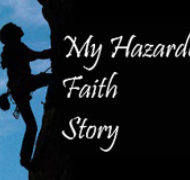Discipleship in the Public Domain of Work
Blog / Produced by The High Calling
The following excerpt is from "Hazardous: Committing to the Cost of Following Jesus" by Ed Cyzewski and Derek Cooper.
Rick knew how to run a successful company, but he wasn’t interested in doing that. He wanted to try to create a company which hand-picked its clients, focusing especially on nonprofit organizations that couldn’t pay top dollar for his expertise. Rather than demanding long hours from his employees, Rick insisted that everyone clock out at 5 p.m. sharp. The only exception was Fridays, when the work day ended at noon. Some Fridays he didn’t even open.
Though he and his small team were among the most talented in the field, Rick soon decided that the work wasn’t quite in line with his passions. What he really wanted to do was build homes for orphans, so he closed down his company and set about leading a new nonprofit venture to do just that.
Perhaps Rick’s methods seem a little reckless. Who wants to launch two businesses within a few years of each other? What happens to your salary, benefits, and long-term security if you trade in a business start-up for a relatively new nonprofit? In fact, heading up a nonprofit during a recession isn’t exactly on the bucket list of anybody with an MBA.
Rick’s first business was a high-stakes experiment in reshaping the values of a business. His experiment didn’t provide the fulfillment he hoped for...but the thing about experiments is that you need to keep trying. They are experimental for a reason. As it turned out, Rick’s values and experience made him the natural choice for his next leap into the nonprofit world.
Rick’s original company experimented with the limits of a socially-conscious business. Though it was an apparent failure, its values transferred over to the nonprofit orphanage, where people had to come first. Rick knew how to make money, but that wasn’t what he cared about. He wanted to figure out how to put people first in the midst of his business, and the hiring committee of his nonprofit company recognized that when they brought him on board.
It’s challenging to transfer Kingdom values into the workplace, but Rick recognized that he had no other choice as a follower of Jesus. While there’s nothing wrong with making an honest living, our public lives at work and in social spaces also fall under the domain of Jesus’ rule. The minute we compartmentalize our business or social activities, we resist His calling for our entire lives. The choices we make at the office or in our public free time have a ripple effect on the rest of our personal lives.
Jesus calls some disciples into work that is full-time ministry, while He turns the work of some into full-time ministry that is shaped by the values of His kingdom. It’s not like Jesus has a stopwatch and we all need to dedicate a certain amount of time to a specific kind of ministry. Some of us will serve Him in our free time, others will serve Him through work, others will serve Him as missionaries, and many more will find their calling as full-time parents. Whatever we end up doing, how we use our time falls under the rule of Jesus. Disciples are not supposed to work or to spend leisure time like the rest of the world. Disciples have the privilege of joining God in His redemptive work, where everything is made new under the influence of God’s Spirit.
Like Rick, we are free to re-imagine our work according to the values of God’s kingdom. This reshaping of our professional and public lives is how the mustard-seed Kingdom grows today.
Post by Ed Cyzewski, co-author of Hazardous: Committing to the Cost of Following Jesus, and the author of Coffeehouse Theology. He shares his imperfect and sometimes sarcastic perspective on following Jesus at www.inamirrordimly.com.





